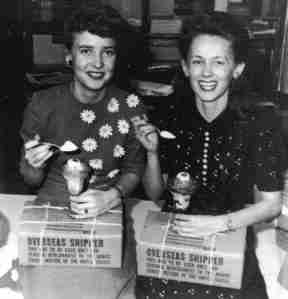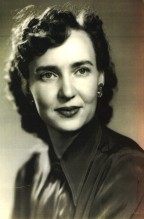A Young Widow Faces the War Years . . . alone!
Mary Beth Spoltz (maiden name Whitfield) pictured on right in 1950
I was born, and grew up, on a farm near the small town of Madisonville, Kentucky where I attended high school. Like the rest of the country during the late 30's and early 40's, we were aware of the fighting in Europe, but it was so far away. One of my best friends had a brother who was among the first to ferry planes to England, so we felt a little closer to danger than some. It really became personal, though, when one of our former high school football players was killed in the attack on Pearl Harbor.
After that, of course, all our lives changed drastically. All the single boys either enlisted or were drafted and disappeared in all directions. I was married, but we had no children so we knew it was only a matter of time until the draft notice came -- It did! But it arrived two weeks too late! My husband had died of pneumonia. He had taken a job in a shipyard on the Ohio River to help the war effort until he was called into the service. That winter was bitter cold. They thought that going back and forth from the cold on deck to the overheated interior of the ship under construction caused it. There were fewer medical doctors back then - and what there were, were off to war. A doctor finally came from Madisonville, but, without the wonder drugs of today, he could do little.
As a 22-year old widow with my friends scattered all over the world, I decided to go to Jackson, Mississippi, to be with my cousin and try to get my life back together. I went to work right away. My cousin and I became active with the U.S.O. Since there were several bases near Jackson we met boys from all over the country. Most of them were far from their homes and family for the first time in their lives. They were homesick and scared. They felt they had no control over anything happening to them – they were right! We made a lot of friends and we wrote to them after they were shipped out, but a lot of them quit writing after they were sent into action so we never learned their fate.
|

|
|
|
Meanwhile, at home, everything became hard to get. If you had car problems you couldn't just go buy a new one -- there weren't any. It was even hard to get one repaired because parts were not being made and mechanics were in the service. There were very few apartments available and almost no houses since here was no construction of any kind. We had to have ration stamps for almost everything: coffee, sugar, gas - even shoes. Being a shoe-a-holic, that was especially hard for me! Some of the boys gave us gas coupons when they shipped out and that helped. At that time, we were much more style conscious--we wore hats, gloves and hose just to go shopping! I remember taking silk hose (this was pre-nylon) to Kennington's to be mailed away just to repair a run.
Even though we were very lucky not to be bombed like England, it felt like our world was turned upside down. A lot of people landed in strange places after the war was over. This was a war we were forced to fight and thank God were able to win. When I try to sum it up in my mind after all these years it seems like a huge roller coaster ride. There were a lot of fun times with the dating, dancing and dining with all the boys. But then there were the times when the only news was of how many of these boys had been killed. We were not at all sure at the start of the war that we would prevail; it was a terrible feeling - one I hope never comes to our country again. A terrible price was paid for what we have today and we must never forget it!
Send Corrections, additions, and input to:
|
Visitors since
June 6, 2000 |
